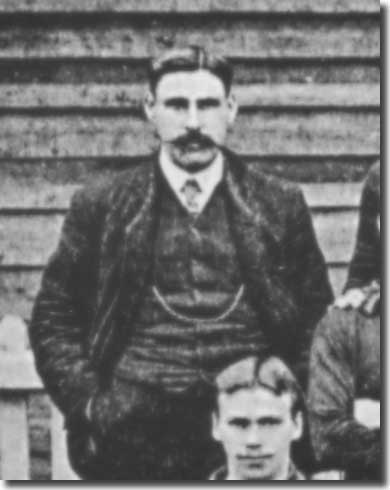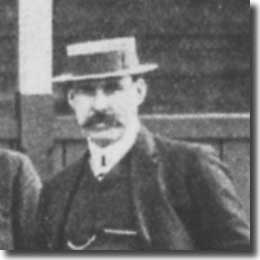 Born:
Oakengates, Shropshire, 3 February 1870
Born:
Oakengates, Shropshire, 3 February 1870
George Swift, the club's trainer, made a shock debut for Leeds City
at outside-left when the club faced Chelsea at Stamford Bridge on 31
March 1906. Aged 36 and having not played for three years, he was called
up with Leeds woefully short of players.
Swift, a left-back, had earned a name for himself in the Midlands as
football got off the mark as a competitive sport in the late 19th century.
After leaving St George's School in Oakengates, Swift started his working
life as an engine fitter. He began playing for the aptly named St George's
Swifts and joined Wellington Town in 1885. He had trials for Stoke in
1886 before joining Wellington St George's and then Crewe in 1888.
In August 1891, he joined Wolverhampton Wanderers of the Football League.
There was only one division at the time and Swift made his league debut
on 14 September 1891 in a 5-0 win over Accrington, one of four games he
played that season. He earned a regular spot at left-back and scored once
in 59 league appearances for Wolves over the next four years. In 1892/93,
he was an ever present and won an FA Cup winner's medal when Wanderers
beat Everton 1-0 in the final at Fallowfield, Manchester, on 25 March
1893 before a crowd of 45,000.
In 1894, Swift left Wolves for Loughborough Town. He was selected to
represent the Football League against the Irish League at the Victoria
Ground, Stoke, in November 1895. After the game he was awarded a nine
carat gold and enamel medal. He later put it up for auction but it failed
to make its reserve price - Sotheby's had hoped it would raise £500.
Swift moved on to Leicester Fosse in August 1896 and was appointed club
captain. He became almost omnipresent over the following six years, appearing
in 186 league games and 14 Cup-ties.
In June 1902 he switched to Notts County and appeared 16 times. He
had not played for a couple of years when he formally announced his
retirement in 1905 and took on the role of trainer at newly-elected
Leeds City.
Gilbert Gillies was nominally
the manager at Elland Road, but his duties were essentially administrative
and Swift exercised a significant influence over the playing side of
things.
Swift made an astonishing comeback as a player at the end of March
1906 with City in disarray. They had come out of a fearsome confrontation
at Grimsby on 17 March with a host of injuries. When they travelled
to meet Chelsea in London two weeks later, they had only nine fit players
with them. Bob Watson had broken down in
Burnley on his journey down and City sent a telegraph to Elland Road
seeking reinforcements. Unfortunately, the second team had already set
off for a game in the North East and only Harry
Stringfellow was available to join the party. Swift was still registered
as a player and was drafted into  the side for the day, playing as a
makeshift left winger, though he dropped into the defence when Dick
Ray sprained his left knee early in the second half. The Londoners
ran out easy 4-0 winners, and it was clear that Swift would be making
no long term comeback.
the side for the day, playing as a
makeshift left winger, though he dropped into the defence when Dick
Ray sprained his left knee early in the second half. The Londoners
ran out easy 4-0 winners, and it was clear that Swift would be making
no long term comeback.
He departed Elland Road in the summer of 1907 to take over as secretary-manager
at Chesterfield on a two-year deal, on the recommendation of former Saltergate
manager Gillies. Swift enjoyed little success in the role; Chesterfield
finished second bottom in 1908, but were fortunate enough to be re-elected
to the League. They finished in the same position in 1909 but this time
lost their League place as a result. Swift was re-appointed at the end
of his contract and it looked a good decision when Chesterfield won the
Midland League in 1909/10. He rocked the club to its foundations, however,
when he resigned one game into the 1910/11 season, claiming that the club
couldn't afford to pay him.
In April 1911, Swift re-emerged as manager of Southampton, being appointed
from a list of 140 applicants. He spent £820 on eleven new players in
his first six weeks in charge, but the changes made no difference to
a poor side and they ended the season 16th, prompting Swift to resign
in despair.
He died in 1956.











 Born:
Oakengates, Shropshire, 3 February 1870
Born:
Oakengates, Shropshire, 3 February 1870 the side for the day, playing as a
makeshift left winger, though he dropped into the defence when Dick
Ray sprained his left knee early in the second half. The Londoners
ran out easy 4-0 winners, and it was clear that Swift would be making
no long term comeback.
the side for the day, playing as a
makeshift left winger, though he dropped into the defence when Dick
Ray sprained his left knee early in the second half. The Londoners
ran out easy 4-0 winners, and it was clear that Swift would be making
no long term comeback.